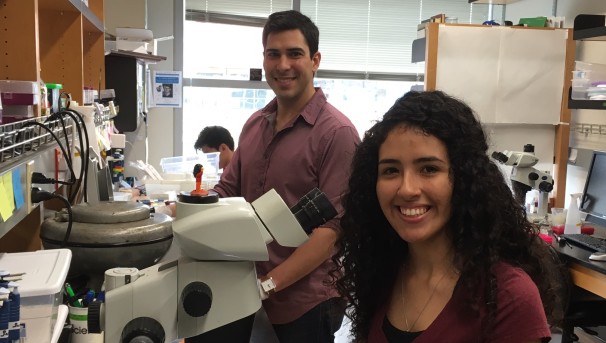This project is now in update mode. Check back regularly to see how things are progressing.
Laurie Nelson
In Memory of My grandfather
$100
Apr 26, 2017
Beth Burnside
In Memory of Sissie Burnside
$600
Apr 25, 2017
Joe Cantu
In Honor of Sonia Cantu
$500
Apr 25, 2017
John Fiorito
In Honor of Sonia Cantu
$2,000
Apr 24, 2017
Constance Ellington
In Memory of My mother, Doris Boles Warbington
$500
Apr 24, 2017
Marcia Maslow
In Memory of Doris Warbington (beloved grandmother)
$300
Apr 24, 2017
Anonymous
$25
Apr 22, 2017
Navid
Ghorashian
$50
Apr 21, 2017
Anonymous
$25
Apr 21, 2017
Anonymous
$25
Apr 21, 2017
Celeste Hamman
In Honor of Megan Celeste Tibbels
$100
Apr 20, 2017
Anonymous
$100
Apr 20, 2017
Anonymous
$500
Apr 20, 2017
Anonymous
$250
Apr 20, 2017
Jill
Tibbels
Undisclosed Amount
Apr 20, 2017
Casey Dickerson
In Memory of Paul Hargrave
$25
Apr 20, 2017
Allie
McCann
$100
Apr 20, 2017
Anonymous
$25
Apr 20, 2017
Buffy Burnett
In Memory of George & Daisy Rust
Undisclosed Amount
Apr 19, 2017
Hisayo
Ogushi
$100
Apr 19, 2017
Mary and Andrew Ritchie
In Honor of Sarah Ritchie
$100
Apr 19, 2017
George and Karen
Casey
$1,000
Apr 19, 2017
Don & Patti
Gentry
Undisclosed Amount
Apr 16, 2017
Robert & Peg Walsh
In Memory of Roberta Walsh
$100
Apr 16, 2017
Anonymous
$50
Apr 14, 2017
$10
Worm buster
Named for the surprising side effect of developing Alzheimer's disease in worms. In humans, Alzheimer's kills neurons important for memory. In worms, it kills neurons important for laying eggs. Without these neurons, babies hatch inside their moms. By encouraging your friends to donate $10 with your own donation will combine to make big impact in Alzheimer's research.
$25
Plaque preventer
Named for the aggregates of toxic peptides in the brains of Alzheimer's patients, a $25 gift paves the way towards our successful undergraduate research training program.
$50
Speedway Spirit
Named for the street by our research lab in the Neuromolecular Science lab, $50 provides enough support for undergraduates to purchase essential supplies such as pipettes and Petri dishes for Alzheimer's experiments.
$100
Littlefield leader
Named after the café where our students caffeinate for morning and late night experiments. $100 provides funds to test 50 new drugs to test on our Alzheimer's model.
$250
Longhorn legend
Named for our beloved mascot, $250 provides critical reagents used to study the difference between peptides in vulnerable and resistant neurons in Alzheimer's disease. Donors will receive an easy-to-understand update on current Alzheimer's disease research.
$500
Synapse supporter
Named for the connections between neurons that become dysfunctional in Alzheimer's disease, $500 provides a full month of summer salary support to one undergraduate student to conduct research. Donors will be invited to receive a personal tour of our lab to see research in action.
$1,000
Alois Advocate
Named for the remarkable researcher Alois Alzheimer's, who first characterized the disease in 1906, $1000 provides salary support for an undergraduate students as well as our Research Associate to provide expert training in Alzheimer's research. Donors will be invited to receive a personal tour of our lab to see research in action, and will receive an easy-to-understand update on current Alzheimer's disease research.
$2,000
APOE Adventurer
Named for the major risk factor in Alzheimer's disease, a $2000 donation would provide a full summer worth of salary for an undergraduate for research training. Donors at this level will be invited to receive a personal tour of our lab to see research in action, will receive an easy-to-understand update on current Alzheimer's disease research, and will get to try some Alzheimer's disease experiments themselves as "researcher for an afternoon".
$5,000
Alzheimer's Avenger
Generous donations at this $5000 level will allow undergrads in our lab to complete a screen for new drugs that may stop the death of neurons caused by toxic Alzheimer's proteins. Donors at this level will be invited to receive a personal tour of our lab to see research in action, will receive an easy-to-understand update on current Alzheimer's disease research, and will get to try some Alzheimer's disease experiments themselves as "researcher for an afternoon". Moreover, they will have a gene named after them that when mutated reduces Alzheimer's risk.






